- Home
- Howard Jacobson
The Act of Love Page 2
The Act of Love Read online
Page 2
Observing him later, in the little centrally heated village hall to which we’d trooped after the service, plied double like the saplings, I wondered whether the bleak weather had been responsible for his appearance at the graveside, so much less saturnine was he, divested of his coat, his scarf and, if I wasn’t mistaken, the widow. To say he was merry would be to go too far, but he’d turned animatedly unapproachable, as opposed to simply unapproachable. A cold fire seemed to come off him, like stars off a sparkler.
He was handsome, if you find high and hawkish men handsome. As a non-predatory man myself, I felt intimidated by him. But that’s part of what being handsome means, isn’t it: instilling fear.
He was standing by a table of sausages and pork pies, making access to it difficult for other people, flirting icily with two poochy-looking girls who, for no other reason than that he appeared to wish to divide them, I took to be sisters. He gave the impression, fairly or not, of a man who would cross any boundary if there was gloomy mischief in it. It was this same impression that made me wonder whether the girls were quite of an age to be spoken to with such freedom, all things considered. Exactly how old they were I couldn’t tell – when you don’t have children of your own (and I am not a breeding man) you lose the power to distinguish twelve from twenty-seven – but they wore the nakedly raffish expressions of girls who know they can get you a prison sentence.
For his part, though Marius allowed them to feel they had exclusive use of his attention and were exclusively the beneficiaries of his brilliance, he succeeded at the same time in holding them up as a sort of reproach to the gathering, as though it was their dullness that reduced him to whiling away his time with chits in black lipstick and nose rings. But I might have misread him. Perhaps he was deeply affected by the funeral, consumed by a grief which only indiscreet intercourse with the young and the provocative could assuage.
What did they see in him, I wondered, that dissolved the usual indifference young girls feel towards lugubriously clever men nearly twice their age. They laughed with a responsiveness that would have been flagrant at a coming-out ball let alone a funeral breakfast. They raised their bare, flushed, perilous pixie faces to him, ablaze with the consciousness that there was an audacity in his starry attention that demanded a reciprocal boldness from them.
Quite suddenly, as though he feared a scene, he called it to an end, recalling himself to what he owed the dear departed and his widow, however dull their conversation. But in the moment before he left the girls I caught him mouthing a phrase at them – half secretly, half not. I, for one, had no difficulty interpreting the communication, but then I miss very little that has a promise of impropriety in it. And yes, I admit it, will find impropriety where impropriety isn’t. Not this time though.
‘Four . . . o’ . . . clock,’ he said without making a sound.
So what was he doing? Arranging to meet them after school?
Four o’clock.
The tremble hour.
If it was an assignation, he didn’t keep it – that was my guess. The jailbait, yes; one, or more likely both of them, each egging the other on as they stood at whatever corner Marius had instructed them to meet him, pulling back their frilly sleeves to consult their Mickey Mouse watches every other minute, laughing into their handkerchiefs, while their pulpy hearts pounded inside their blazers. But not Marius. What he wanted from the girls he had already taken.
How you can tell on so brief an appraisal (and most of it from behind) that a man is an absentee libertine, that he lights fires and doesn’t stop to see them blaze, that at the last he’d sooner withhold a sexual favour than confer one, I can’t explain. Perhaps that sort of sadism shows in the curvature of the spine. Perhaps I’m just good at seeing what I want to see. However you account for it, I felt, in advance, the ‘sting of his disregard’ – I steal the phrase from Leopold Bloom, Bloomuponwhom, the patron saint of the subjugated and deceived – as acutely as those girls would have felt it at four o’clock on whatever day in whatever place Marius did not turn up to meet them.
My territory – sexual insult. I’m a connoisseur of it. I could write you a treatise, a thousand pages long, and in a dozen languages, some of them dead, on the difference between a sting and a smart. It comes, partly, from an extensive and perhaps over-collaborative reading of that category of classic novel (English, French, Russian, whatever) whose subject is humiliation. I’m tempted to ask what other category of classic novel is there. But I accept – if with bewilderment – that there are some readers who open books in order to be mystified by extravagant event, or stirred by acts of prosaic heroism. I must have been born without a taste for mystery or heroics.
Love, that is all I’ve ever cared to read about. Love and love’s agonies.
Love afflicted me.
I draw no distinction between literature and life. In the stories I precociously devoured I gravitated naturally to the pain – to the sorrows alike of Young Werther and the older Alexei Alexandrovich Karenin, to the easily bruised boyish prickliness of Julien Sorel and the deep womanly contemplative sadness of Anne Elliot. But it had never been any different for me in life. I was born lovesick – unrequited, highly strung, quiveringly jealous, with a morbid yearning to give my heart long before there was anyone to give my heart to.
That I too would be spurned, left to pine away like the heroes and heroines of my reading, I never doubted.
The first girl I could ever truly call a girlfriend – the first girl whose fingers I was allowed to interlace with mine – betrayed me the second time I took her out. We went into the cinema together and she left two and a half hours later with someone else. How and where she found him when there appeared to be only she and I sitting alone in the darkness and I had never once let go of her hand, what she saw in him with the lights down wherever she found him, why she preferred him to me, what I lacked or had done wrong that could explain that preference or her cruelty in making it so plain – none of this I understood. I was fifteen, she the same. She had a cascade of black hair, eyes like a fortune-teller’s and long, slender brown arms which I imagined wrapped around me twice. She had kissed previously, I had not. But she came from a family of teachers – her father taught cello at the Royal Academy of Music – and she said she would enjoy teaching me to kiss. Now, inexplicably, she was enjoying teaching another pupil more.
I stood outside her house after school for weeks, imagining that she would relent, that what had happened had been a mistake, a confusion that conversation or just the sight of me would clear up, but she never showed her face, not even at a window. I hoped her father might come out. As a cello teacher he would surely have understood my desolation. But he too never appeared. Eventually a girl emerged from the house, I assumed Faith’s sister, to inform me of the situation. ‘Faith says she’s going out with Martin now. She says would you please go home and leave her alone.’
I put my satchel down as though I meant to stay rooted to that spot forever. What did I want? The earth to open up and take me? A retraction from Faith of her sister’s words? A glimpse of Martin that would at least show me what I didn’t have?
The sister must have been moved by the spectacle of thwarted love I presented because she found a kinder tone in which to say, ‘These things happen. You’ll get over it.’
I never did get over it. What I suffered in the loss of Faith, reason told me, was quite disproportionate to what I’d felt for her on the mere two occasions we’d gone out and the time I’d thought about her in between. But reason was no help. Nothing helps against jealousy. I began to idealise her beauty. Her arms grew longer and more slender. Her kisses, which had been no more than tentative and toothy, were now deep probings, as fathomless as the sea and as desperate as drowning, only someone else was swimming in them and I was drowning in their absence. I was unable to eat. My schoolwork suffered. My head ached. I felt murderous, not to Faith or Martin but to myself. Had I possessed more of whatever it was that girls wanted this could not have hap
pened. And it was too late to acquire that mysterious whatever it was now, because there was no future in which to put it into practice.
I rubbed at the pain in my heart. Probed it, polished it, until there was no skin left between my heart and me. Was it Faith I missed or was it myself, the self I’d been when she’d wound her lovely arms around me twice? Where to locate the hurt exactly – in the kisses that had been stolen from me almost before they’d begun, or in the insult of her preferring Martin? What was it she saw in him? What was it she didn’t see in me? What was it, what was it, what was it . . . ?
It made me careful thereafter – in the thereafter I never thought there’d be – never to hurt as I’d been hurt, never to leave the cinema with anyone other than the person I’d gone into the cinema with, never to show that I preferred kissing someone else. How to survive jealousy became the study of my life. How to accept that someone you love might not love you in return. How to bear her kisses going elsewhere. How to face up to abandonment – the knowledge that you are and will remain unloved, cast out, not just because you are not worthy in yourself, but because you stand in the way of two other people’s happiness. Made lonely for all eternity so that they can be for all eternity together.
‘You know my motto,’ my father said in a cloud of cigar smoke. ‘If you miss one bus there’s always a second.’
He was disgusted by my weeping. I was disgusted, plain and simply, by him.
‘What’s the use of a second bus when you’ve been knocked down by the first?’ I replied.
He shrugged. ‘You’ll have a few broken bones,’ he said, ‘no more.’
‘Bones!’
My mother was more sympathetic, though of no more help. I did not visit her in her room, which for as long as I could remember had been a chamber of private grief, for she too had been abandoned. But she came to me one morning as I lay disconsolate and motionless on my bed, looking up at the ceiling, nursing a sadness which day by day had been making a permanent home for itself in my body – a molten river of acid and scalding honey that moved with slow deceptive sweetness through my veins.
‘Is it always like this?’ I asked her.
‘Betrayal?’
‘Love.’
She thought about it for some moments, pulling her brocade dressing gown around her. She had always appeared to be from another age, my mother, as though abandoned into an earlier time. ‘I wish I could tell you it isn’t,’ she said. ‘But you will find someone else, and then you’ll forget what happened this time.’
‘And when it happens again?’
She touched my hand. A gesture of unusual warmth in my family where touching was reserved for impropriety or rejection. ‘You might be lucky,’ she said. ‘It might not happen again.’
‘What might make it not happen again?’
‘You might learn to love the next person a little less. Or at least invest a little less in her.’
‘But would that then be love?’
‘Ah, now that,’ she said, gathering herself up, ‘is the big question.’
I might only have been fifteen, but I knew the big answer. If you wanted to be in love – and I wanted nothing else – then you had to welcome into your soul love ‘s symptoms and concomitants: fear of betrayal which was no less potent than the fear of death, jealousy which ate into the very marrow of your bones, a feverish anticipation of loss which no amount of trust would ever assuage. Loss – loss waited upon gain as sure as day followed night, that’s if day would ever follow night again. You loved not only expecting to lose but in order to lose – this my favourite books had told me and now I’d put them to the test in life I knew them to be right. You loved to lose and the more you loved the more you lost. Fear and jealousy were not incidental to love, they were love.
The molten river sluiced through my body, as though it had found its natural course there and would never leave me.
Good that something would never leave me.
I didn’t take the train back to London after the funeral as I’d meant to do. Some impulse or other kept me in Much Wenlock. Not a desire to hit the town even though it was a Saturday night. I ordered sandwiches and ate them in my hotel room. Everything in the hotel was on a slant. The sandwiches slid off the tray. My bottle of beer slid off the bedside table. It was only by holding on to the mattress that I was able to avoid sliding out of bed.
But the crookedness of the place went with my mood. I’d been disarranged.
I was woken by the sound of Sunday church bells ringing. A mocking sun was streaming in through the curtains. The old man was buried and now life could begin again. I decided to take advantage of what could be the only sun Shropshire was going to see for a hundred years and dressed quickly. I needed breakfast and wasn’t prepared to risk a fried egg sliding on to my lap, so I went looking for a café. After that I mooched around, taking in the priory, a few half-timbered buildings, at last finding a couple of bookshops of the sort I make a point of investigating when I’m out of town. I rarely find anything of value but I never fail to buy a book or two, simply as a way of expressing fellow feeling. Of all the forms of that premature interment I’ve talked about, selling books in the provinces is the most pitiable. They sit behind their wooden tables, pretending to read – though they’ve read their entire stock a dozen times already – entering their few sales into a ledger with a blunt pencil. Could so easily have been me, I always think, but for the worldly far-seeingness of my ancestors, making sure our destiny would be in Marylebone, London’s city within a city. Felix Quinn: Antiquarian Booksellers – in the quiet assurance of our name I believe you hear the confidence of a family that couldn’t imagine ever living more than a few hundred yards from everything the soul and body of man requires: art galleries, concert halls, good restaurants, suppliers of wine and cheese, infirmaries, bordellos.
Others must travel to satisfy these needs; we had only to stretch out a hand.
Indeed, it was one of my father’s recurrent malodorous jokes that at his age happiness resided solely in being able to reach out his hand and feel under a woman’s skirt. He didn’t mean my mother’s.
By the time I’d searched the shelves of the bookshops and made consolatory, not to say condescending, conversation with their hapless proprietors I needed lunch. It was gone three when the taxi slid me out at Shrewsbury station. All the trains were late. I pounded the far end of the platform in irritation, looking for somewhere to sit in the sun, wondering whether to pick fights with people who took up seats with their luggage. People with backpacks always the worst offenders. Walkers! Those masochists who think their minds are healthy. At last a seat fell empty and I bagged it. When I looked around me I saw that I was sitting next to Marius.
He was still dressed funereally. I thought I could see traces of cemetery clay on his shoes and even on his jacket. But that was probably fanciful. I glanced at him a couple of times, hoping for one of those half smiles that invite conversation. I was curious to know why he’d been at the funeral, what his relations were to poor Jim Hanley and his widow. Maybe, if we were travelling to London on the same train, he’d tell me about his penchant for picking up and then letting down underage schoolgirls. Explain the appeal of sadism to me.
‘Such a beautiful afternoon,’ I said at last, accepting that if I waited for him I’d wait forever. ‘Weather like this makes one wish one were somewhere else, don’t you think?’
He favoured me with the quickest of looks, such as a wild animal might throw a man he’s not afraid of, but doesn’t want to eat. It was evident that if I wished to be somewhere else, he wished I’d go there. It was equally evident that he didn’t recognise me from the funeral.
I threw my head back and screwed my eyes against the sun to make it easy for him if he didn’t want to reply. Let it never be said that I’m not a complaisant man.
Deciding not to be rude to me, he looked at his watch. ‘Time of the day, squire,’ he said.
I wasn’t sure I understood him. Was that a questi
on? Was he wondering if his watch was slow? ‘What about the time of the day?’ I asked.
‘It’s the reason you want to be somewhere else. Nuffink to do with the weather,’ He consulted his watch again. ‘You’re smelling somewhere faraway. Four o’clock has that effect.’
I was surprised to detect a faint accent. I mean under the faux cockney or whatever it was he was affecting. Not West Midlands quite, but nearly. I hadn’t imagined him accented. It disappointed me. I wanted him pristine. I viewed him, as I have said, pornographically and pornography is a picky medium. It permits no extraneous material or tomfoolery. Just the clean, chill sepulchral lines of sexual violation and the silence that comes after.
‘And which faraway place does four o’clock smell of to you?’ I asked.
‘Ah!’ he said, as though that were a question that reached deep inside his soul. He drummed his fingers on the briefcase he carried on his lap and appeared to let his imagination roam worlds real and fanciful. I waited, expecting Petra or Heraclea, the Galapagos Islands or the Fields of Troy. I knew a pedant when I saw one. They always are, these queasy, tyrannical men. They ease their disgust by reading the classics.
‘Thanatos,’ was what he finally came up with. Proving me right. He was a tyrant.
I pulled a face. ‘Thanatos?’
‘You’re wondering where that is? Greek for death, matey.’
It took all my restraint not to tell him I’d rather he didn’t treat me as one of his schoolgirls. ‘I know what Thanatos is Greek for,’ I said. ‘I’m only surprised to hear you call death a place.’
‘What would you call it?’
‘The end of place.’
He rubbed his hand across his mouth as though to stop himself from laughing at me, or from ripping me apart with his teeth. I understood how those girls had felt. It was exciting to be near him. Dangerous, somehow, as though the death he spoke of was an entity he had power over. I felt I was sitting on Shrewsbury station with a vampire.

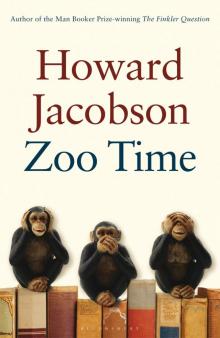 Zoo Time
Zoo Time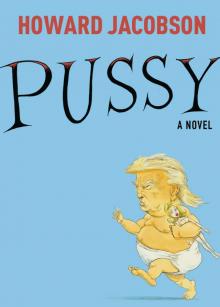 Pussy
Pussy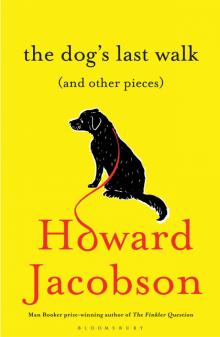 The Dog's Last Walk
The Dog's Last Walk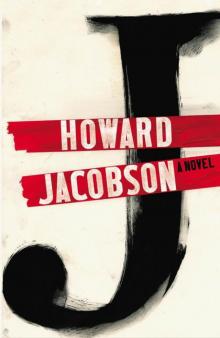 J
J Shylock Is My Name
Shylock Is My Name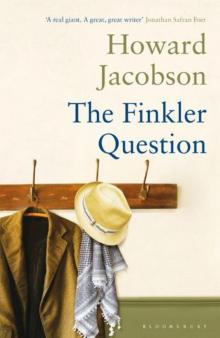 The Finkler Question
The Finkler Question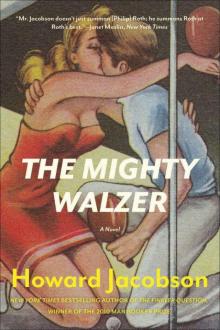 The Mighty Walzer
The Mighty Walzer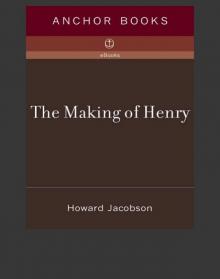 The Making of Henry
The Making of Henry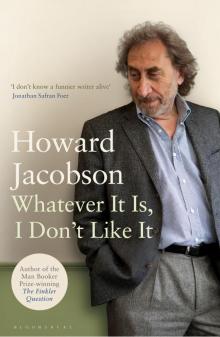 Whatever it is, I Don't Like it
Whatever it is, I Don't Like it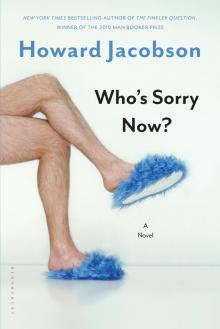 Who's Sorry Now?
Who's Sorry Now? Kalooki Nights
Kalooki Nights